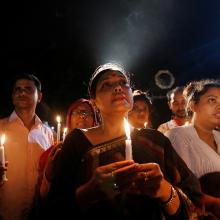islamic extremism
In the wake of the terrorist attack at the Ariana Grande concert in Manchester, Muslims along with the rest of the diverse British city are mourning the dead and tending to the wounded.
But for Muslims in particular, the suicide bombing that left more than 20 dead and dozens wounded on May 22 has also sown fear. They worry about a backlash from those who would blame all followers of Islam for the carnage, for which the so-called Islamic State takes credit.
The global growth of Islam, and in particular the rise of Islamic extremism, have forced recent popes to set out, with increasing urgency, a strategy for engaging the religion.

Image via REUTERS/Pascal Rossignol/RNS
France was convulsed by another horrific attack on July 26 as armed men burst into a Catholic Church near Rouen and slit the throat of a priest who was saying Mass.
The slain priest, the Rev. Jacques Hamel, 84, was one of four people taken hostage by the attackers, who authorities said had claimed to be from Daesh, the Arabic term for the Islamic State group.

Image via Essential Image Media/Shutterstock.com
Nice, on France’s Mediterranean coast, now joins a long list of cities, on four continents, where Islamist terrorists have perpetrated gruesome attacks, mercilessly killing hundreds of innocents.
And those are just where some of the highest-profile outrages have occurred, the ones that attract headlines. The fact that millions of people, mostly other Muslims, survive under the daily brutality of violent Islamists in large parts of Syria, Iraq, Libya, Gaza, Nigeria, and elsewhere is so routine as to barely be newsworthy.

Image via Stefano Rellandini/REUTERS/RNS
Pope Francis has telephoned leaders of the terror-stricken French city of Nice, asking them what he could do to help in the wake of last week’s gruesome truck attack and promising to meet with the families of the victims as soon as possible.
The pontiff made his call out of the blue on July 17, reaching the former mayor of Nice and leader of the region, Christian Estrosi, through the head of a national association of Italians who live in France.

Image via REUTERS/Adnan Abidi/RNS
A vortex of hatred is sweeping across the globe, from a nightclub in Orlando to an airport in Istanbul to a restaurant in Dhaka.
At its center are individuals who wrap their savagery in the cloak of Islam. But these terrorists — perhaps 50,000 to 100,000 of the world’s 1.6 billion Muslims — are a perversion of the faith. They do not represent the Islam beloved by moderates like me.

Hyeon Soo Lim on trial in North Korea. Image via Reuters/RNS
With North Korea leading the way and Islamic extremism rapidly expanding, 2015 was the “worst year in modern history for Christian persecution,” according to a group tracking this issue.

Image via REUTERS / James Akena / RNS
Francis marked the start of the jubilee on Dec. 8, when he opened the Holy Door at St. Peter’s Basilica in Rome. The yearlong celebration calls on Catholics to reflect on the theme of mercy and forgiveness and showcase a more inviting faith. That theme resonates in Africa, home to about 200 million Catholics. A sizable part of this population is tormented by war, violence from Muslim extremists, HIV/AIDS, and poverty.

Street march protesting the killings in Bangladesh. Image via Ashikur Rahman / REUTERS / RNS
Right now, a contentious debate over religious freedom is tearing at the social fabric of a nation, and partisans seeking to take advantage of the uproar are fueling the fires of mistrust and division.
But I’m not talking about the U.S. and arguments over contraceptive mandates and same-sex marriage. (And I’m certainly not talking about red coffee cups!) This struggle for religious freedom is taking place in Bangladesh, and the “debate” is being waged not with words and laws, but with machetes and terror.
In the past eight months, five people have been hacked to death by Islamic extremists associated with terror groups such as Ansar Bangla and al-Qaida. Each victim was targeted for writing or publishing works that advocate for secular democracy and criticize religion and fundamentalism. Many other writers have been injured in these attacks.
As world attention shifts to the growing influence of Muslim militant groups on the African continent, few have paid any attention to the ongoing bloody conflict in South Sudan.
An estimated 50,000 people have died and 2 million have been displaced in the latest phase of fighting in this nation, according to the International Crisis Group, a think tank that aims to prevent and resolve such conflicts. That’s about five times more than in northern Nigeria, where the Islamist militant group Boko Haram has killed more than 5,000 people in six years.
“South Sudan’s conflict is not getting much attention due to shifting interests towards Islamic extremism,” said the Rev. Fred Nyabera of Kenya, a social scientist who is director of the Interfaith Initiative to End Child Poverty at the global faith-based organization Arigatou International. “This has become a global issue because of the immediate threats it poses to nations.
“But leaving South Sudan alone at this time when the people are trying to define their identity and country, under very fragile circumstances, is to postpone a big problem,” Nyabera added.
1. Can the U.S. Ever Figure Out its Messed-Up Maternity Leave System?
“According to the United Nations’ International Labour Organization, there are only two countries in the world that don’t have some form of legally protected, partially paid time off for working women who’ve just had a baby: Papua New Guinea and the U.S.”
2. Post-Evangelicals and Why We Can’t Just Get Over It
Rachel Held Evans pens this spot-on column about identity and why it can be difficult to “simply” ditch the label: “When you grow up believing that your religious worldview contains the key to absolute truth and provides an answer to every question, you never really get over the disappointment of learning that it doesn’t.”
3. This Is What the Oscar Nominations Look Like Without All the Men
A really great visualization.
4. From Lone Wolf to Wolf Packs, What Paris Says About a New Model of Terror
If some interpretations of the recent terrorist attacks hold true, they "point to a dangerous evolution [in] global jihadism: an acceleration in hard-to-detect lone-wolf or wolf-pack attacks that hinge more on the proliferation of an ideology than actual sponsorship by any group.”
I love Jon Stewart. I mean, like “maybe jump the fence” love him. His presence on The Daily Show has spoken to and with my generation through some of our most formative years.
And yes, he tells fart jokes (which I also love). And yes, he editorializes, (which is nearly ubiquitous in “legitimate news” streams anyway). But he also often names what people are thinking, feeling, or what they can’t even put into words.
And then he helps us laugh about it, and at ourselves.
On a recent episode of The Daily Show, however, he took a more sober tone when talking about the slaughter in the headquarters of the French satire magazine, Charlie Hebdo. One comment in particular that he made stuck with me, not because it was funny or witty. Rather, it pointed to something we all need to consider more seriously, I think.
Muslims in America are much less inclined to support suicide bombing than other Muslims abroad, and are more likely to believe that people of other faiths can attain eternal life in heaven, according to a new report released Tuesday by the Pew Forum on Religion & Public Life.
“The World’s Muslims” report looks at Muslim views across seven categories: Islamic law; religion and politics; morality; women; relations among Muslims; interfaith relations; and religion, science, and pop culture. There is also a special section on U.S. Muslims.
Of the countries surveyed, only a majority of Muslims in America — 56 percent — believe people of other faiths can go to heaven; by contrast, that figure among U.S. Christians is about 64 percent. U.S. Muslims are also less likely than Muslims abroad to believe in evolution, sharing views that are closer to those of U.S. Christians.
On suicide bombing, 81 percent of U.S. Muslims said it was never justified, 7 percent said it was justified to “defend Islam,” and 1 percent said it was “sometimes justified.”
Similar to many of my Western counterparts, my first thoughts when I first heard about the attacks in Norway went to extreme Islamic terrorism. I had heard about the growing tensions in Scandinavia because of the increasing Muslim population and cultural shifts arising as a result. Thus, when I heard through a friend that a Norwegian school had been attacked, I assumed the attack to be a response from a Muslim terrorist group. I asked if it was al Qaeda or such other organization. My friend responded, "Probably." Thus, you can imagine my surprise when I saw the picture of the suspect who appeared very Scandinavian with fair skin and complexion.
According to the New York Times, the attacks in Oslo killed at least 92 people and the orchestrator left behind "a detailed manifesto outlining preparations and calling for Christian war to defend Europe against the threat of Muslim domination." If I had read that statement out of context, I would think one was talking about the Christian Crusades of the 12th century.




